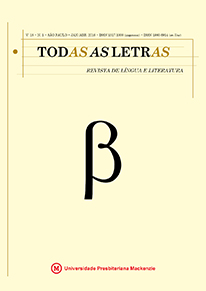Lusophone space: use of idiomatic expressions
the same effects of meaning in different linguistic structures
Abstract
The article discusses about idiomatic expressions with different lin-guistic structures and same meaning construction. It presents theoretical and conceptual aspects of the Lusophony and lexicology. It aims to explain the processes of the use of idiomatic expressions and their relations with the Por-tuguese-speaking world for the establishment of sociolinguistic and cultural similarities in the different countries of Portuguese language. As a methodolo-gical procedure, this article collects news stories on websites of selected coun-tries – Angola, Brazil, Guinea-Bissau and Portugal – with analysis of sociolin-guistic and cultural aspects in the Portuguese-speaking world. The conclusion is that different language structures generate the same sense, characterizing the interculturality in this Portuguese-speaking world, what truly approxima-tes the cultures of the countries that speak Portuguese, and also their socio-linguistic relations.Downloads
References
BASTOS, N. B. Apresentação. In: BASTOS, N. B. (Org.). Língua portuguesa: re-flexões lusófonas. São Paulo: Educ, 2006.
BIDERMAN, M. T. C. Léxico e vocabulário fundamental. Alfa, São José do Rio Preto, v. 40, p. 27-46, 1996.
BRITO, R. H. P. de. Reflexões sobre o português em Timor-Leste. Revista Macken-zie deEducação, Arte e História da Cultura, São Paulo, v. 2, n. 1, p. 87-95, 2003.
BRITO, R. H. P. de; MARTINS, M. de L. Moçambique e Timor-Leste: onde tam-bém se fala o português. In: CONGRESSO IBÉRICO DE CIÊNCIAS DA COMPU-TAÇÃO/CONGRESSO PORTUGUÊS DA ASSOCIAÇÃO PORTUGUESA DE CIÊNCIAS DA COMUNICAÇÃO (SOPCOM), 2., 3., 2004, Covilhã. Disponível em: <http://hdl.handle.net/1822/1005>. Acesso em: 27 abr. 2016.
CARREIRA, M. H. A. A língua portuguesa em contexto: saberes linguísticos, discursivo-textuais e culturais. In: BASTOS, N. B. (Org.). Língua portuguesa: lusofonia – memória e diversidade cultural. São Paulo: Educ, 2008.
DUARTE, I. M. Passado e presente: a produtividade de provérbios e outras ex-pressões fraseológicas no português europeu. In: BASTOS, N. B. (Org.). Língua portuguesa: aspectos linguísticos, culturais e identitários. São Paulo: Educ, 2012.
DUBOIS, J. et al. Dicionário de linguística. São Paulo: Cultrix, 1993.
FIORIN, J. L. A lusofonia como espaço linguístico. In: BASTOS, N. B. (Org.). Língua portuguesa: reflexões lusófonas. São Paulo: Educ, 2006.
GUERRA, M. M.; ANDRADE, K. de S. O léxico sob perspectiva: contribuições da lexicologia para o ensino de línguas. Domínios da Linguagem, Uberlândia, v. 6, n. 1, p. 226-241, 2012.
HOUAISS, A.; VILLAR, M. de S. de S. Dicionário Houaiss da língua portuguesa. Rio de Janeiro: Objetiva, 2001.
KOERNER, K. Questões que persistem em historiografia da linguística. Tradu-ção Cristina Altman. Revista da Anpoll, n. 2, p. 45-70, 1996.
MARTINS, M. de L. Lusofonia e luso-tropicalismo – equívocos e possibilidades de dois conceitos hiper-identitários. In: BASTOS, N. B. (Org.). Língua portuguesa: reflexões lusófonas. São Paulo: Educ, 2006.
NAMBURETE, E. Língua e lusofonia: a identidade dos que não falam português. In: BASTOS, N. B. (Org.). Língua portuguesa: reflexões lusófonas. São Paulo: Educ, 2006.
NAMBURETE, E. A lusofonia no espaço moçambicano. In: BASTOS, N. B. (Org.). Língua portuguesa: aspectos linguísticos, culturais e identitários. São Paulo: Educ, 2012.
SÁ, E. J. de. O léxico na região Nordeste: questões diatópicas. ReVEL, v. 9, n. 17, p. 244-261, 2011.SILVA, M. E. B. da. O dinamismo lexical: o dizer nosso de cada dia. In: AZERE-DO, J. C. de (Org.). A língua portuguesa em debate: conhecimento e ensino. Petrópolis: Vozes, 2000.
SILVEIRA, J. G. da. Dicionário de expressões populares da língua portuguesa. São Paulo: WMF Martins Fontes, 2010.
SILVEIRA, R. C. P. da. Descrição da língua portuguesa – língua e cultura: ques-tões teóricas e metodológicas. In: BASTOS, N. B. (Org.). Língua portuguesa: re-flexões lusófonas. São Paulo: Educ, 2006.
URBANO, H. Da fala para a escrita: o caso de provérbios e expressões popula-res. Investigações, v. 21, n. 2, p. 31-56, 2008. Disponível em: <http://www.re-positorios.ufpe.br/revistas/index.php/INV/about>. Acesso em: 27 abr. 2016.XATARA, C. M. Tipologia das expressões idiomáticas. Alfa, São Paulo, v. 42, p. 169-176, 1998.
XATARA, C. M.; SECO, M. Culturemas em contraste: idiomatismos do português brasileiro e europeu. Domínios de Linguagem, Uberlândia, v. 8, n. 1, p. 502-519, jan./jun. 2014.
Downloads
Additional Files
Published
How to Cite
Issue
Section
License
Copyright (c) 2016 Todas as Letras - Revista de Língua e Literatura

This work is licensed under a Creative Commons Attribution-NonCommercial 4.0 International License.
The originals accepted and published become property of Mackenzie Presbyterian University, being forbidden their total or partial reproduction without permission of the Editorial Board, except for study and research.




